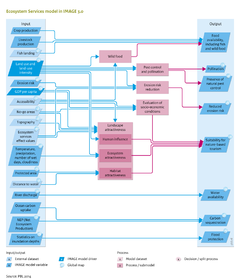Ecosystem services: Difference between revisions
Jump to navigation
Jump to search
No edit summary |
Oostenrijr (talk | contribs) No edit summary |
||
| Line 1: | Line 1: | ||
{{ComponentTemplate2 | {{ComponentTemplate2 | ||
|Application=Millennium Ecosystem Assessment - MA (2005) project | |Application=Millennium Ecosystem Assessment - MA (2005) project | ||
|IMAGEComponent=Drivers; Nutrients; Agriculture and land use; Water; Land degradation; Terrestrial biodiversity; Flood risks; | |IMAGEComponent=Drivers; Nutrients; Agriculture and land use; Water; Land degradation; Terrestrial biodiversity; Flood risks; | ||
|KeyReference=Schulp et al., 2012; Van Kolck et al., in preparation; | |KeyReference=Schulp et al., 2012; Van Kolck et al., in preparation; | ||
|Reference=Burkhard et al., 2012; MA, 2005; TEEB, 2010a; De Groot et al., 2012; Haines-Young and Potschin, 2013; TEEB, 2010b; Van Jaarsveld et al., 2005; Egoh et al., 2012; Bagstad et al., 2013; Garcia-Nieto et al., 2013; Foley et al., 2011; EC, 2012; | |Reference=Burkhard et al., 2012; MA, 2005; TEEB, 2010a; De Groot et al., 2012; Haines-Young and Potschin, 2013; TEEB, 2010b; Van Jaarsveld et al., 2005; Egoh et al., 2012; Bagstad et al., 2013; Garcia-Nieto et al., 2013; Foley et al., 2011; EC, 2012; | ||
| Line 16: | Line 16: | ||
* ''Supporting services'': Processes assisting the supply of other ecosystem services, such as soil nutrient cycling supporting the provisioning of agricultural production though often not identified as a separate category. | * ''Supporting services'': Processes assisting the supply of other ecosystem services, such as soil nutrient cycling supporting the provisioning of agricultural production though often not identified as a separate category. | ||
Since the Millennium Ecosystem Assessment, the concept of ecosystems services has drawn increasing attention with many studies determining the influence on human well-being ([[Van Jaarsveld et al., 2005]]; [[TEEB, 2010b]]; [[TEEB, 2010a]]; [[Burkhard et al., 2012]]). For example, the TEEB study focused on the economic implications of the losses of a variety of ecosystem services , and other studies have tried to unravel the less tangible benefits of ecosystems to illustrate the importance of ecosystem conservation (Egoh et al., 2012]]; [[Bagstad et al., 2013]]; [[Garcia-Nieto et al., 2013]]). | Since the Millennium Ecosystem Assessment, the concept of ecosystems services has drawn increasing attention with many studies determining the influence on human well-being ([[Van Jaarsveld et al., 2005]]; [[TEEB, 2010b]]; [[TEEB, 2010a]]; [[Burkhard et al., 2012]]). For example, the TEEB study focused on the economic implications of the losses of a variety of ecosystem services , and other studies have tried to unravel the less tangible benefits of ecosystems to illustrate the importance of ecosystem conservation ([[Egoh et al., 2012]]; [[Bagstad et al., 2013]]; [[Garcia-Nieto et al., 2013]]). | ||
Understanding of ecosystem services is needed because pressures on ecosystems tend to increase as the world population grows and consumption patterns change. Unsustainable use and degradation of ecosystems may diminish delivery of services and may eventually impact on human well-being ([[MA, 2005]]; [[TEEB, 2010a]]; [[OECD, 2012]]). While food production, an ecosystem service itself, is increasing, it also puts pressure on other services, for instance by forest conversion to agricultural land may result in decreasing supply of clean water, ecotourism, and flood and drought control ([[MA, 2005]]; [[Foley et al., 2011]]). | Understanding of ecosystem services is needed because pressures on ecosystems tend to increase as the world population grows and consumption patterns change. Unsustainable use and degradation of ecosystems may diminish delivery of services and may eventually impact on human well-being ([[MA, 2005]]; [[TEEB, 2010a]]; [[OECD, 2012]]). While food production, an ecosystem service itself, is increasing, it also puts pressure on other services, for instance by forest conversion to agricultural land may result in decreasing supply of clean water, ecotourism, and flood and drought control ([[MA, 2005]]; [[Foley et al., 2011]]). | ||
Revision as of 14:40, 16 June 2014
Parts of Ecosystem services
| Component is implemented in: |
|
| Related IMAGE components |
| Projects/Applications |
| Key publications |
| References |
Key policy issues
- How would ecosystem services and the benefits from the natural environment develop in the absence of specific policies?
- How could policy interventions contribute to improving future ecosystem services?
- How could policy interventions influence the interaction between ecosystem services and other goals and ambitions, such as the millennium development goals?
